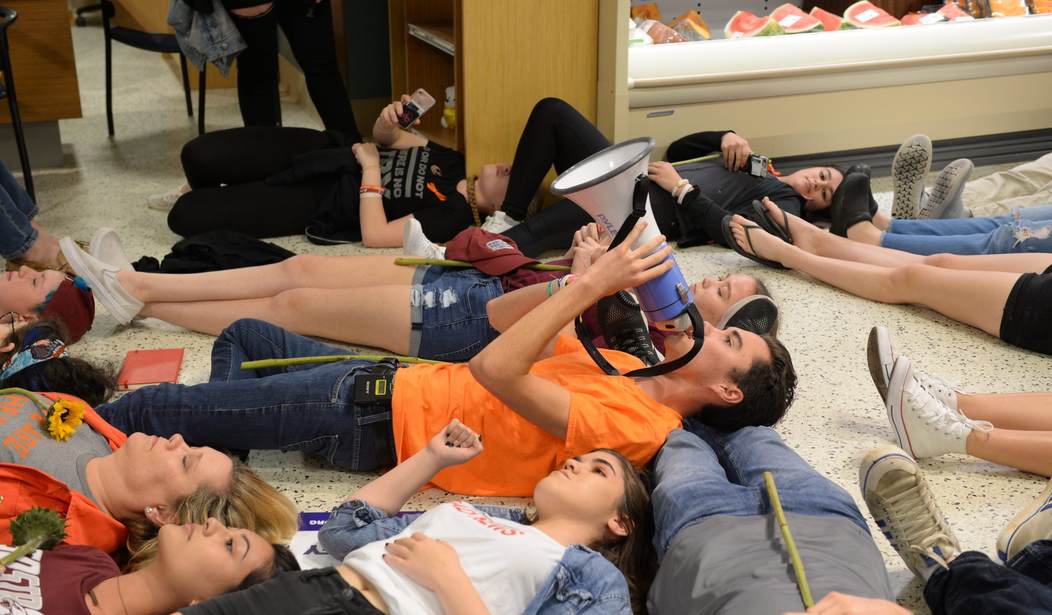Watching teenagers marching across the country demanding Congress do something about gun violence after the Parkland, Fla., high school shooting that killed 17 people was an epiphany for Michigan Democratic state Sen. David Knezek.
It was those demonstrations and the #NeverAgain movement, Knezek said, that showed him it was time to give 16-year-olds the right to vote in Michigan.
“We allow 16-year-olds to go off and get jobs and pay taxes, but we fail to allow them to exercise their voice come election time,” said Knezek, 31, who is the youngest member of the Michigan Legislature.
”Young people are setting aside their differences and identifying issues they think need to change. And they can do everything to get that change except vote,” Knezek added as he proposed a constitutional amendment to give 16-year-olds the right to vote in Michigan’s state and local elections.
Knezek’s proposal, along with companion legislation introduced in the Michigan House, will probably never see the light of a full House or Senate debate in the legislature controlled by the GOP.
But if somehow Republicans let this idea out of committee, the constitutional amendment would require a supermajority in the Michigan House and Senate and the backing of a majority of Michigan voters. If Michigan 16-year-olds are to be allowed to vote in federal elections, Congress would have to pass the amendment before sending it to the state for ratification.
Of course, Knezek, 31, the youngest member of Michigan’s legislature, is not the first to come up with this idea. In April, seven of the 13 members of the Washington, D.C., City Council said they would support allowing 16-year-olds to vote. Council member Charles Allen (D), who sponsored the bill, said he too was inspired by the teenagers he saw pouring into America’s streets to protest gun violence.
“We work, we pay taxes, we care for family members, we can drive, we can do so many other things. So, adding voting onto that isn’t going to be that big of a responsibility. We can handle it,” said Alex Shyer, a 16-year-old high school sophomore in D.C.
House Minority Leader Nancy Pelosi (D-Calif.) endorsed the idea of letting teenagers vote in a 2015 speech to an audience at the Generation Progress “Make Progress” Summit.
“I am all for – I’d love to hear your thoughts on it; I know you’ll let me know – for lowering the voting age to high school age, whether that’s 16 or 17,” Pelosi said.
“Because when kids are in school, they’re so interested, they’re so engaged. And we’d like them to be at least registered [to vote] before they leave – hopefully, to register,” Pelosi concluded.
Laurence Steinberg, a professor of psychology at Temple University, wrote in the New York Times that teenagers’ response to the Parkland, Fla., shootings shows it is time to give them the right to vote.
“The proposal to lower the voting age to 16 is motivated by today’s outrage that those most vulnerable to school shootings have no say in how such atrocities are best prevented. Let’s give those young people more than just their voices to make a change,” Steinberg opined as he also disputed the notion that a 16-year-old’s brain is not sufficiently developed to make a voting booth decision.
But David Davenport, a research fellow at the Hoover Institution, thinks that’s nonsense.
“Researchers generally agree that the brain is still developing until the mid-20s, with moral reasoning and abstract thought coming later than we once thought,” Davenport wrote in the Washington Examiner. “So the drinking age has gone up to 21, and the age when kids may drive a car without any conditions has now increased to 17 or 18 under most state laws, not 16.”
Davenport also noted the tendency of young people to be more liberal than people who are older, “growing the pool of younger voters likely to help Democrats over Republicans,” which is one reason he thinks Pelosi and other Dems are so enthused over the idea.
He also disputed Pelosi’s contention that teenagers are “so interested, so engaged.”
How can that be, Davenport wondered, when “in the last round of national civics tests a mere 23 percent scored as ‘proficient’ or above.”
“What we should be promoting among the young is better civic education before greater civic engagement,” Davenport concluded.
If promoting the youth vote is the purpose of lowering the voting age to 16, Michigan political reporter Chad Selweski wrote in an op-ed for Deadline Detroit, it would be much better to focus on getting more millennials to vote, especially those in that demographic who are 18-24 years of age.
“After all, less than 40 percent of the nationwide 18-24 group showed up at the polls in 2016,” Selweski wrote. He also noted one estimate indicates that 36 percent of Michigan’s 18-24-year-olds are not even registered to vote in the 2018 midterm elections.
If the state constitutional amendment to allow 16-year-olds to vote in Michigan fails to gather the supermajority needed to make it through the House and Senate, a petition drive could be used to offer the amendment to voters via a 2020 statewide ballot proposal.
But given millennials reticence, for whatever reason, to bother to even register, Selweski noted backers of the proposal might want to think twice before asking for a public vote.
“In fact, the result could be an embarrassing loss,” Selweski wrote. “Would more than 10 or 20 percent of the 18-24 crowd even show up at the polls to support their younger brethren?”









Join the conversation as a VIP Member